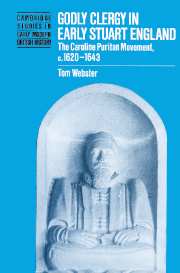Book contents
- Frontmatter
- Contents
- Acknowledgments
- List of abbreviations
- Introduction
- Part I Society, clerical conference and the Church of England
- Part II The godly ministry: piety and practice
- Part III ‘These uncomfortable times’: conformity and the godly ministers 1628–1638
- 7 Thomas Hooker and the conformity debate
- 8 Trajectories of response to Laudianism
- 9 The ecclesiastical courts and the Essex visitation of 1631
- 10 Juxon, Wren and the implementation of Laudianism
- 11 The diocese of Peterborough: a see of conflict
- 12 The metropolitical visitation of Essex and the strategies of evasion
- Part IV ‘These Dangerous Times’: the Puritan Diaspora 1631–1643
- Index
- Cambridge Studies in Early Modern History
8 - Trajectories of response to Laudianism
Published online by Cambridge University Press: 04 November 2009
- Frontmatter
- Contents
- Acknowledgments
- List of abbreviations
- Introduction
- Part I Society, clerical conference and the Church of England
- Part II The godly ministry: piety and practice
- Part III ‘These uncomfortable times’: conformity and the godly ministers 1628–1638
- 7 Thomas Hooker and the conformity debate
- 8 Trajectories of response to Laudianism
- 9 The ecclesiastical courts and the Essex visitation of 1631
- 10 Juxon, Wren and the implementation of Laudianism
- 11 The diocese of Peterborough: a see of conflict
- 12 The metropolitical visitation of Essex and the strategies of evasion
- Part IV ‘These Dangerous Times’: the Puritan Diaspora 1631–1643
- Index
- Cambridge Studies in Early Modern History
Summary
From the experience of the Ockley conference we can learn, in particular, four important lessons. The first is the existence of a constituency among those recognising themselves, and recognised, as ministers of the godly sort, which might perceive the controverted ceremonies as unprofitable and not tending to edification, and even as an evil to be suffered rather than merely adiaphorous. These ministers might administer the sacrament to those who knelt, might use the sign of the cross in baptism and wear the surplice, holding them to be enjoined by lawful authority, holding controversy to be unprofitable or seeing them as a necessary price to be paid for the liberty to preach, which, as we saw in earlier chapters, was at the centre of their vocation. It would be an error to call such ministers ‘conformist’, although they might write to, or confer with, their brethren to persuade them to use the ceremonies or to leave the controversies over them. It is perhaps more accurate to call such ministers ‘conformable’, that is, capable of conforming, without being committed to a defence of the ceremonies in any positive sense.
Secondly, we can see that members of this constituency were coming under pressure. Goodwin, Nye, Davenport and Whitfield changed their practice after the Ockley conference, a decision directly contrary to the best hopes of a settled life and the peaceful exercise of their vocation. It is possible to suggest that they changed their practice without changing their judgement: the arguments of those I would like to call ‘conformable’, of Whately, Byfield and especially Sprint, were conditional.
- Type
- Chapter
- Information
- Godly Clergy in Early Stuart EnglandThe Caroline Puritan Movement, c.1620–1643, pp. 167 - 179Publisher: Cambridge University PressPrint publication year: 1997



